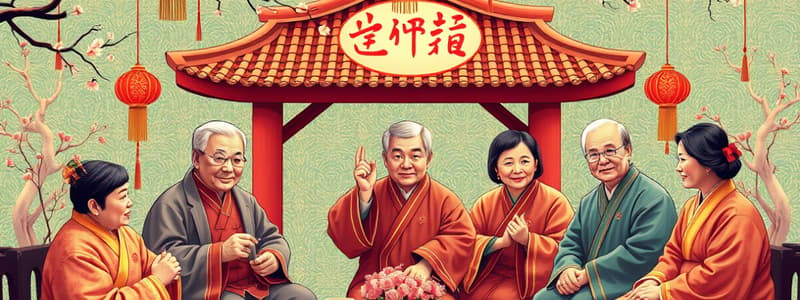Podcast
Questions and Answers
What is the primary theme associated with the Mid-Autumn Festival?
What is the primary theme associated with the Mid-Autumn Festival?
- Loyalty to the emperor
- Worshipping the dragon totem
- Reunion of people (correct)
- Wisdom and cleverness
The Double Ninth Festival is celebrated on the ninth day of the eighth month of the lunar calendar.
The Double Ninth Festival is celebrated on the ninth day of the eighth month of the lunar calendar.
False (B)
Who is commemorated during the Dragon Boat Festival?
Who is commemorated during the Dragon Boat Festival?
Qu Yuan
During the Qixi Festival, women demonstrate skills in __________ as a way to pray for happiness and cleverness.
During the Qixi Festival, women demonstrate skills in __________ as a way to pray for happiness and cleverness.
Match the festivals with their associated activities:
Match the festivals with their associated activities:
What unique activity is often associated with the Double Ninth Festival?
What unique activity is often associated with the Double Ninth Festival?
The Qixi Festival originated during the Tang Dynasty.
The Qixi Festival originated during the Tang Dynasty.
What does the Winter Solstice signify in the Chinese lunar calendar?
What does the Winter Solstice signify in the Chinese lunar calendar?
What is the significance of the Spring Festival in Chinese culture?
What is the significance of the Spring Festival in Chinese culture?
The Lantern Festival occurs before the Spring Festival.
The Lantern Festival occurs before the Spring Festival.
What traditional activity is associated with the Lantern Festival?
What traditional activity is associated with the Lantern Festival?
The Ching Ming Festival involves visiting ________ family members.
The Ching Ming Festival involves visiting ________ family members.
Match the festivals with their descriptions:
Match the festivals with their descriptions:
Which of the following statements about the Lantern Festival is true?
Which of the following statements about the Lantern Festival is true?
The Ching Ming Festival is a time when people traditionally eat hot meals.
The Ching Ming Festival is a time when people traditionally eat hot meals.
In which month does the Ching Ming Festival occur?
In which month does the Ching Ming Festival occur?
Flashcards are hidden until you start studying
Study Notes
Spring Festival
- Most significant traditional festival in China, celebrated by Han and various ethnic minorities.
- Emphasizes family reunions, with people traveling long distances to return home for celebrations.
- Represents hope and best wishes for the upcoming year, serving as a profound expression of emotions.
- Acts as a spiritual foundation for the Chinese nation, embodying the essence of a cultural carnival.
Lantern Festival
- Celebrated on the first full moon night of the year, known as Yuan month in the lunar calendar.
- Originated during the Qin Dynasty, over 2,000 years ago.
- Customs include moon gazing, lantern lighting, solving riddles, and eating traditional foods.
- Features local performances such as dragon dancing, lion dancing, and various folk arts.
Ching Ming Festival
- Evolved from the Cold Dish Festival, where lighting candles was prohibited.
- Focused on visiting and honoring deceased ancestors, with customs of tomb-sweeping.
- Combines nostalgia and remembrance, encouraging people to connect with nature during springtime.
- Takes place in April, symbolizing the start of new life and growth.
Dragon Boat Festival
- Traditionally a totem sacrifice festival for tribes worshiping the dragon in ancient Baiyue.
- Started as a dragon boat race on the fifth day of the fifth lunar month.
- Commemorates poet Qu Yuan, who committed suicide in the Miluo River, reflecting themes of loyalty and patriotism.
- Regional variations also honor figures like Wu Zixu and Cao E.
Qixi Festival
- Celebrated on the seventh day of the seventh lunar month, tracing origins to the Han Dynasty.
- Involves women seeking wisdom and skill in needlework, with a legend linked to the Cowherd and Weaver Girl symbolizing love.
- Customs have influenced neighboring countries, including Japan, Korea, and Vietnam, showcasing cultural exchange.
Mid-Autumn Festival
- Dates back to the early Tang Dynasty, gaining popularity during the Song Dynasty.
- Symbolizes family reunion and community through moon appreciation and mooncake consumption.
- Customs include worshipping the moon and enjoying seasonal cuisine; influences extend to East and Southeast Asia.
Double Ninth Festival
- Observed on the ninth day of the ninth month of the lunar calendar.
- Activities include autumn outings, climbing high places for views, and enjoying chrysanthemums.
- Cultural practices involve eating Chongyang cake and drinking chrysanthemum wine.
Winter Solstice
- Significant solar term in the Chinese lunar calendar, recognized for over 2,500 years.
- Traditionally acknowledged with various customs, marking the turn of seasons and a time for family gatherings.
Studying That Suits You
Use AI to generate personalized quizzes and flashcards to suit your learning preferences.




